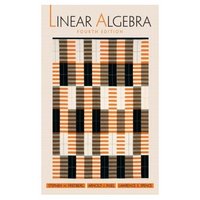06-240/About This Class: Difference between revisions
No edit summary |
No edit summary |
||
| Line 10: | Line 10: | ||
<blockquote> |
<blockquote> |
||
A theoretical approach to: vector spaces over arbitrary fields including <math>{\mathbb C}</math>, <math>{\mathbb Z}_p</math>. Subspaces, bases and dimension. Linear transformations, matrices, change of basis, similarity, determinants. Polynomials over a field (including unique factorization, resultants). Eigenvalues, eigenvectors, characteristic polynomial, diagonalization. Minimal polynomial, Cayley-Hamilton theorem. |
A theoretical approach to: vector spaces over arbitrary fields including <math>{\mathbb C}</math>, <math>{\mathbb Z}_p</math>. Subspaces, bases and dimension. Linear transformations, matrices, change of basis, similarity, determinants. Polynomials over a field (including unique factorization, resultants). Eigenvalues, eigenvectors, characteristic polynomial, diagonalization. Minimal polynomial, Cayley-Hamilton theorem. |
||
| ⚫ | |||
*Prerequisite: MCB4U, MGA4U |
*Prerequisite: MCB4U, MGA4U |
||
*Co-requisite: MAT157Y1 |
*Co-requisite: MAT157Y1 |
||
| ⚫ | |||
[[Image:Friedberg_Insel_Spence_Cover.jpg|right|200px]] |
[[Image:Friedberg_Insel_Spence_Cover.jpg|right|200px]] |
||
===Text Book=== |
===Text Book(s)=== |
||
Our main text book will be ''Linear Algebra'' (fourth edition) by Friedberg, Insel and Spence, ISBN 0-13-008451-4. |
Our main text book will be ''Linear Algebra'' (fourth edition) by Friedberg, Insel and Spence, ISBN 0-13-008451-4; it is a required reading. I am told that Schaum’s ''Outline of Linear Algebra'', ISBN 0-07-136200-2, may contain useful examples; it is not a required reading. |
||
===Marking Scheme=== |
|||
There will be one term test (25% of the total grade) and a final exam (50%), as well as 7 to 9 homework assignments (25%). |
|||
====The Term Test==== |
|||
Note regarding missed term tests: A student who misses the term test without providing a valid reason (for example, a doctor’s note) within one week of the test will receive a mark of 0 on the term test. There will be no make-up term test. If a student misses the term test for a valid reason, the weight of the problem sets will increase to 35% and the weight of the final exam to 65%. |
|||
| ⚫ | |||
Assignements will be posted on the course web page and distributed in class as shown in the class timeline. They will be due a week later at the tutorials and they will be marked by the TAs. All students (including those who join the course late) will receive a mark of 0 on each assignment not handed in; though in computing the homework grade, your worst two assignments will not count. I encourage you to discuss the assignments with other students or even browse the web, so long as you do at least some of the thinking on your own and you write up your own solutions. Remember that cheating is always possible and may increase your homework grade a bit. But it will hurt your exam grades a lot more. |
|||
| ⚫ | |||
Students will be able to earn up to 25 "good deeds" points throughout the year for doing services to the class as a whole. There is no pre-set system for awarding these points, but the following will definitely count: |
|||
* Drawing a beautiful picture to illustrate a point discussed in class and posting it on this site. |
|||
* Taking classnotes in nice handwriting, scanning them and posting them here. |
|||
* Typing up or formatting somebody else's classnotes, correcting them or expanding them in any way. |
|||
* Writing an essay on expanding on anything mentioned in class and posting it here; correcting or expanding somebody else's article. |
|||
* Doing anything on our [[06-240/To do]] list. |
|||
* Any other service to the class as a whole. |
|||
Good deed points will count towards your final grade! If you got <math>n</math> of those, they are solidly your and the formula for the final grade below will only be applied to the remaining <math>100-n</math> points. So if you got 25 good deed points (say) and your final grade is 80, I will report your grade as <math>25+80(100-25)/100=85</math>. Yet you can get an overall 100 even without doing a single good deed. |
|||
| ⚫ | |||
'''Important.''' For your good deeds to count, you '''must''' do them under your own name. So you must set up an account for yourself on this wiki and you must use it whenever you edit something. I will periodically check [[Special:Recentchanges|Recent changes]] to assign good deeds credits. |
|||
| ⚫ | |||
===Class Photo=== |
===Class Photo=== |
||
Revision as of 09:16, 29 August 2006
| ||||||||||||||||||||||||||||||||||||||||||||||||||||||
Crucial Information
Agenda: Understand linear algebra, the simplest algebra there is, and come to appreciate that simplest is also the most fundamental.
Hidden Agenda: Learn (by example) how "real" math is done: abstraction and generalization, definitions, theorems and proofs.
Instructor: Dror Bar-Natan, drorbn@math.toronto.edu, Bahen 6178, 416-946-5438. Office hours: by appointment.
Classes: Tuesdays 1-3 and Thursdays 1-2 at MP 203.
| Teaching Assistants: Dmitry Donin, donin@math.toronto.edu, Bahen 6191, 416-978-2095 and Paul Lee, plee@math.toronto.edu, Bahen 6135, 416-978-4794.
Tutorials: Thursdays 2-4 at MP 203 if the last digit of your student number is even, and at MP 118 if it is odd. |
URL: https://drorbn.net/drorbn/index.php?title=06-240.
Abstract
Taken from the Faculty of Arts and Science Calendar:
A theoretical approach to: vector spaces over arbitrary fields including [math]\displaystyle{ {\mathbb C} }[/math], [math]\displaystyle{ {\mathbb Z}_p }[/math]. Subspaces, bases and dimension. Linear transformations, matrices, change of basis, similarity, determinants. Polynomials over a field (including unique factorization, resultants). Eigenvalues, eigenvectors, characteristic polynomial, diagonalization. Minimal polynomial, Cayley-Hamilton theorem.
- Prerequisite: MCB4U, MGA4U
- Co-requisite: MAT157Y1
Text Book(s)
Our main text book will be Linear Algebra (fourth edition) by Friedberg, Insel and Spence, ISBN 0-13-008451-4; it is a required reading. I am told that Schaum’s Outline of Linear Algebra, ISBN 0-07-136200-2, may contain useful examples; it is not a required reading.
Marking Scheme
There will be one term test (25% of the total grade) and a final exam (50%), as well as 7 to 9 homework assignments (25%).
The Term Test
Note regarding missed term tests: A student who misses the term test without providing a valid reason (for example, a doctor’s note) within one week of the test will receive a mark of 0 on the term test. There will be no make-up term test. If a student misses the term test for a valid reason, the weight of the problem sets will increase to 35% and the weight of the final exam to 65%.
Homework
Assignements will be posted on the course web page and distributed in class as shown in the class timeline. They will be due a week later at the tutorials and they will be marked by the TAs. All students (including those who join the course late) will receive a mark of 0 on each assignment not handed in; though in computing the homework grade, your worst two assignments will not count. I encourage you to discuss the assignments with other students or even browse the web, so long as you do at least some of the thinking on your own and you write up your own solutions. Remember that cheating is always possible and may increase your homework grade a bit. But it will hurt your exam grades a lot more.
Good Deeds
Students will be able to earn up to 25 "good deeds" points throughout the year for doing services to the class as a whole. There is no pre-set system for awarding these points, but the following will definitely count:
- Drawing a beautiful picture to illustrate a point discussed in class and posting it on this site.
- Taking classnotes in nice handwriting, scanning them and posting them here.
- Typing up or formatting somebody else's classnotes, correcting them or expanding them in any way.
- Writing an essay on expanding on anything mentioned in class and posting it here; correcting or expanding somebody else's article.
- Doing anything on our 06-240/To do list.
- Any other service to the class as a whole.
Good deed points will count towards your final grade! If you got [math]\displaystyle{ n }[/math] of those, they are solidly your and the formula for the final grade below will only be applied to the remaining [math]\displaystyle{ 100-n }[/math] points. So if you got 25 good deed points (say) and your final grade is 80, I will report your grade as [math]\displaystyle{ 25+80(100-25)/100=85 }[/math]. Yet you can get an overall 100 even without doing a single good deed.
Important. For your good deeds to count, you must do them under your own name. So you must set up an account for yourself on this wiki and you must use it whenever you edit something. I will periodically check Recent changes to assign good deeds credits.
Class Photo
To help me learn your names, I will take a class photo on Thursday of the third week of classes. I will post the picture on the class' web site and you will be required to send me an email and identify yourself in the picture or to identify yourself on the Class Photo page of this wiki.


